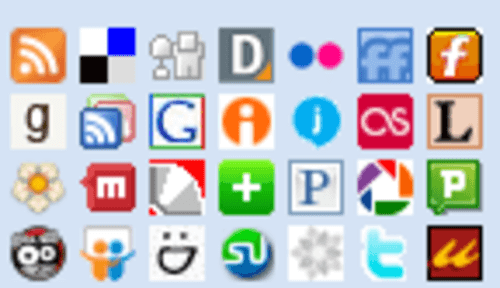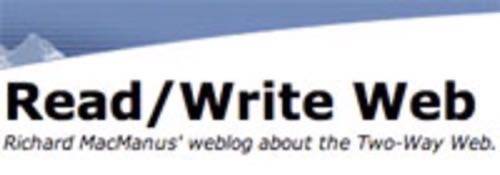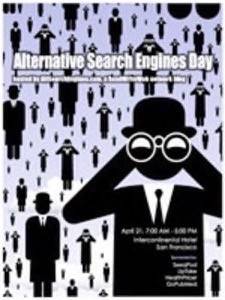This week was a hectic one, with a number of RWW writers present at the annual Web 2.0 Expo in San Francisco. The big Internet news of the week was the launch of Microsoft’s Live Mesh. Yahoo also announced key support for Social Graph and data portability. In social networking news, MySpace officially opened its Application Gallery to all users. In our web trends coverage, Sarah analyzed a Forrester report that claimed Enterprise 2.0 will become a $4.6 Billion industry by 2013, Marshall looked at what will build on the emerging foundation of ubiquitous APIs, Josh investigated the current fad for ‘Web 3.0’, and Alex looked at the increasing stress in our online lives.

But wait, there’s more! This week we held the Alternative Search Engines event, and ReadWriteWeb turned 5.
Sponsor:

Web Apps
Live Mesh: First Look at Microsoft’s New Platform
The new Live Mesh service that just launched as an invite only “technology preview” is Microsoft’s attempt to tie all of our data together. Live Mesh synchronizes data across multiple devices (currently just Windows computers, but theoretically it will extend to mobile and other devices in the future) as well as to a web desktop that exists in the cloud. It can sync data across devices used by a single users, as well as create shared spaces for multiple users. On the surface, Mesh is a lot like competing file sync services such as Dropbox, SugarSync (which we covered in January), and even Microsoft’s own FolderShare product. But what sets Live Mesh apart is its platform approach.

See also: Ray Ozzie Memo Explains Live Mesh Strategy; Full Text of Ray Ozzie Mesh Memo
Yahoo! to Rewire for Social Graph and Data Portability
Yahoo! announced at the Web 2.0 Expo the availability of the first program in its large vision for a dramatic overhaul of the company across all its properties. The Search Monkey developer platform will let site owners alter their search results listing, including through semantic markup.

Search Monkey is just the first of many steps that Yahoo! discussed at Expo. CTO Ari Balogh said that the entire company was rewiring, across all its properties, in the spirit of the social graph and data portability. Flickr’s influence was tangible. In this post we present a high-level overview of some of the biggest changes.

Social Tools for the Office Worker: How to Subvert I.T. and Play at Work
We can’t all eat, breathe, and live social media 24×7, as much as we might like to. Some of have day jobs that require a bit of our attention, too. And unlike the web-app embracing startups we read about, the policies at more traditional companies actually discourage mindless web surfing, tweeting, facebooking, and the like. However, there are still plenty of ways to fit in your social media addictions at work, without getting noticed by your nosy co-workers or getting blocked by I.T.

MySpace Apps Are Go For All Users
MySpace officially opened its Application Gallery to all users this week after launching it in public beta last March. In that time over 1,000 applications have been approved and added to the gallery and there have been over 2.1 million application installs across the site. MySpace began promoting applications to users by adding an icon for the gallery on MySpace.com and a link on user control panels.

See also: When Will Facebook Be Ready for Business?; Start Pages: The Next Social Networks; Study: Social Networks Mirroring Reality TV
SEE MORE WEB APPS COVERAGE IN OUR WEB APPS CATEGORY
Web Trends
Enterprise 2.0 To Become a $4.6 Billion Industry By 2013
A new report released by Forrester Research is predicting that enterprise spending on Web 2.0 technologies is going to increase dramatically over the next five years. This increase will include more spending on social networking tools, mashups, and RSS, with the end result being a global enterprise market of $4.6 billion by the year 2013.

See also: IBM Wants a Piece of Web 2.0 Pie
So we’re only half a decade at most into the Web 2.0 era, and we still don’t really know what “Web 2.0” is. Yet for some reason, over the past couple of years there has been an even more confusing meme that seems to keep cropping up: “Web 3.0.” It already feels like we’ve been talking about Web 3.0 for ages, even though we don’t know yet know exactly what Web 2.0 is. What are the various ways that Web 3.0 has been defined over the past three years, and why is it helpful to talk about what the next web will look like?

See also: There is No Web 3.0, There is No Web 2.0 – There is Just the Web; Tim O’Reilly: Tackle Big, Hard Problems With Web 2.0
So You’re Launching a Platform: After Ubiquitous APIs – What’s the Next Frontier?
We’re here at the Web 2.0 Expo in San Francisco and are getting inundated with press releases about new APIs and developer platforms, many from companies we’ve never even heard of in the first place. How long ago was it that the forward-looking thinkers argued that APIs and platforms would soon be available everywhere?

That time is clearly fast approaching and it makes us wonder: now that this matter is settled, what comes next? We asked a variety of people here and around the web what they thought will define the next frontier, what will build on the emerging foundation of ubiquitous APIs. We got some interesting answers.
Faster – Why Constant Stress is Part of Our Future
A few weeks ago, the New York Times ran a weekend piece entitled In Web World of 24/7 Stress, Writers Blog Till They Drop,
which focused on the stressful nature of blogging. Using our friend Marc Orchant’s death and Om Malik’s heart attack as examples, Matt Richel built a case for web journalism as the cause of certain health woes because of its non-stop, 24/7 real-time nature. There is no doubt that news blogging is stressful.
But it is not just blogging. Real-time anything is stressful. Take TV news, is Anderson Cooper not stressed? Looking broader,
what about air traffic controllers or traders on Wall Street? Any human being that has to make decisions in real-time will be under a lot of stress.

SEE MORE WEB TRENDS COVERAGE IN OUR TRENDS CATEGORY
Special: ReadWriteWeb Turns 5
On 20 April, 2003, ReadWriteWeb was born. My first post here was appropriately entitled The Read/Write Web and it began: “The World Wide Web in 2003 is beginning to fulfil the hopes that Tim Berners-Lee had for it over 10 years ago when he created it.” At the time I started ReadWriteWeb, web 2.0 hadn’t yet been invented, Google Adsense hadn’t launched (it would do so in June ’03), Internet Explorer had 94% of the browser market share (followed by Netscape with 2%), the top blogs of the day according to Technorati were Slashdot (listed as number 1) and Where is Raed ? (a weblog from Baghdad; it closed in 2004). And 5 years ago, there was no money in blogging.

Today the blogging landscape is vastly different. The top blogs now are full-on media businesses. ReadWriteWeb, which started out 5 years ago as an evening hobby for me, has evolved with the times and is now the 11th ranked blog on Technorati’s Top 100 – closing in on #10 Daily Kos! [Update: by the end of the week we’d got to #10!!] The reason we have continued to grow is because ReadWriteWeb is no longer just me. We have a great team of smart, web-savvy and passionate bloggers: Marshall Kirkpatrick, Josh Catone, Sarah Perez, Alex Iskold, Bernard Lunn, Emre Sokullu, and many other occasional and guest writers. ReadWriteWeb nowadays is also a network: last100 (Steve O’Hear and Daniel Langendorf), AltSearchEngines (Charles Knight) and ReadWriteTalk (Sean Ammirati).
Special: Alternative Search Engines Day
This week, before Web 2.0 Expo, our network blog AltSearchEngines held the first ever Alternative Search Engines Day, in San Francisco. It started out with a keynote talk by ASE editor Charles Knight, who noted that alternative search engines only have about 1.7% market share combined. He thinks this is too small, so he wants all of the “alts” – you can see a list of them on our subsite The Search Race – to band together to make a bigger impact on the search market.

The overarching theme to AltSearchEngines Day was to encourage the alts to band together and help each other reach the mainstream audience. Anyone who regularly reads AltSearchEngines will know that there is a ton of innovation in search, literally hundreds of niche and vertical search startups. So this effort to join together to compete with (or complement) the likes of Google and Microsoft is very commendable – and as I mentioned in the opening panel, ReadWriteWeb heartily supports it.
Special thanks to Charles Knight for the vision and pulling this day together, and also LA Lassek and the SeeqPod team for organizing the event. Thanks as well to the sponsors of this event: SeeqPod, UpTake, HealthPricer, MatchPoint, GoPubMed, BlogDimension. Charles is “the voice of alternative search engines” in this industry. He is galvinising and leading the alts forward as a group, so be sure to subscribe to AltSearchEngines to track this initiative.
Last100 News
From our network blog about the digital lifestyle, last100. In Internet TV news, Viacom, Paramount, MGM and Lionsgate announced a joint venture to create a new premium TV channel and VOD service, to be rolled out in the fall of 2009. The project will include a strong online component.

In digital music news, Sony BMG has became the second major label to sign up to Nokias Comes With Music service, whereby customers who buy a supported handset will get a year of unlimited access to millions of tracks. When Nokia first unveiled its all-you-can-eat music offering last December, Universal Music was the sole partner, a natural fit considering that the label has been busy touting its own flat-rate plan known as Total Music. However, the two remaining majors, EMI and Times Warner, have yet to commit to Nokias scheme.
Read more: last100 Weekly wrapup, 21-25 April 2008
That’s a wrap for another week! Enjoy your weekend everyone.










